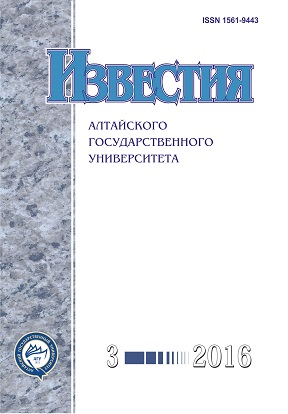The Main Sources of Law in the Assessment of the Regulatory Impact of Normative Legal Acts
DOI:
https://doi.org/10.14258/izvasu(2016)3-02Keywords:
sustainable development, regulatory impact assessment, public administration, regulatory effectsAbstract
The aim of the regulatory impact assessment is to identify projects of normative legal acts of the provisions introducing excessive duties, prohibitions and restrictions to the rights of subjects. The article analyzes the legal and regulatory framework and methodological support of the regulatory impact assessment procedures in Russia at federal and regional levels. Analysis of normative legal provision of the process of regulatory impact assessment suggests the adequacy of the regulatory provision at the federal level, a low level of maintenance at the regional level and the general low level of methodological support of assessment, both at the federal and regional levels. The adoption of normative legal acts only without sufficient methodical support hinders the use of regulatory impact assessment, and reduces the quality of the assessment and further examination of normative legal acts. While introducing the regulatory impact assessment at the regional (in the future at the municipal) level it is recommended not only to take appropriate legal acts at the level of the Russian Federation, but also to provide further methodological and expert support in the process. It is advisable to create the technique, a unified system of evaluation and metrics (indicators), according to which it is possible not only to analyze the effectiveness of regulation in a particular area, but also to carry out a comparative evaluation of the regulation in the context of the RF subjects, which will broadcast the best experience and practices to other regions, improving the quality of public administration and the effectiveness of regulatory measures. DOI 10.14258/izvasu(2016)3-02Downloads
References
Глазкова М.Е., Нанба С.Б. Оценка эффективности действия нормативно-правовых актов: современные подходы // Журнал российского права. - 2011. - № 9.
2
О порядке проведения федеральными органами исполнительной власти оценки регулирующего воздействия проектов нормативных правовых актов, проектов поправок к проектам федеральных законов и проектов решений Совета Евразийской экономической комиссии, а также о внесении изменений в некоторые акты Правительства Российской Федерации : Постановление Правительства РФ от 17 декабря 2012 г. № 1318 // СПС «КонсультантПлюс» [Электронный ресурс]. - URL: http://www. consultant.ru.
3
Об оценке эффективности деятельности органов исполнительной власти субъектов Российской Федерации : Указ Президента РФ от 21.08.2012 № 1199 // Собрание законодательства РФ. - 2012. - № 35. - Ст. 4774.
4
Об оценке эффективности деятельности органов местного самоуправления городских округов и муниципальных районов : Указ Президента РФ от 28.04.2008 № 607 // Собрание законодательства РФ. - 2008. - № 18. - Ст. 2003.
5
О Министерстве экономического развития Российской Федерации : Постановление Правительства РФ от 05.06.2008 № 437 // Собрание законодательства РФ. - 2008. - № 24. - Ст. 2867.
6
О внесении изменений в некоторые акты Правительства Российской Федерации : Постановление Правительства РФ от 15.05.2010 № 336 // Собрание законодательства РФ. - 2010. - № 21. - Ст. 2602.
7
Об утверждении Положения о Порядке подготовки заключений об оценке регулирующего воздействия : Приказ Минэкономразвития России от 31.08.2010 № 398 // Бюллетень нормативных актов федеральных органов исполнительной власти. - 2010. - № 43.
8
Об основных направлениях совершенствования системы государственного управления : Указ Президента РФ № 601 // СПС «КонсультантПлюс» [Электронный ресурс]. - URL: http://www.consultant.ru.
9
Об утверждении Методических рекомендаций по внедрению процедуры и порядка проведения оценки регулирующего воздействия в субъектах Российской Федерации : Приказ Минэкономразвития России от 25.09.2012 № 623 // СПС «КонсультантПлюс» [Электронный ресурс]. - URL: http://www.consultant.ru.
10
Об оказании поддержки проведения высшими исполнительными органами государственной власти субъектов Российской Федерации административной реформы в 2012 г. : Приказ Минэкономразвития России от 30.07.2012 №472 // СПС «КонсультантПлюс» [Электронный ресурс]. - URL: http://www.consultant.ru.
11
Брюханова Н.В. Формирование методического обеспечения института оценки регулирующего воздействия в регионе как базовый элемент результативности его функционирования // Сибирская финансовая школа. - 2014. - № 2 (103).
Downloads
Issue
Section
License
Izvestiya of Altai State University is a golden publisher, as we allow self-archiving, but most importantly we are fully transparent about your rights.
Authors may present and discuss their findings ahead of publication: at biological or scientific conferences, on preprint servers, in public databases, and in blogs, wikis, tweets, and other informal communication channels.
Izvestiya of Altai State University allows authors to deposit manuscripts (currently under review or those for intended submission to Izvestiya of Altai State University) in non-commercial, pre-print servers such as ArXiv.
Authors who publish with this journal agree to the following terms:
- Authors retain copyright and grant the journal right of first publication with the work simultaneously licensed under a Creative Commons Attribution License (CC BY 4.0) that allows others to share the work with an acknowledgement of the work's authorship and initial publication in this journal.
- Authors are able to enter into separate, additional contractual arrangements for the non-exclusive distribution of the journal's published version of the work (e.g., post it to an institutional repository or publish it in a book), with an acknowledgement of its initial publication in this journal.
- Authors are permitted and encouraged to post their work online (e.g., in institutional repositories or on their website) prior to and during the submission process, as it can lead to productive exchanges, as well as earlier and greater citation of published work (See The Effect of Open Access).








